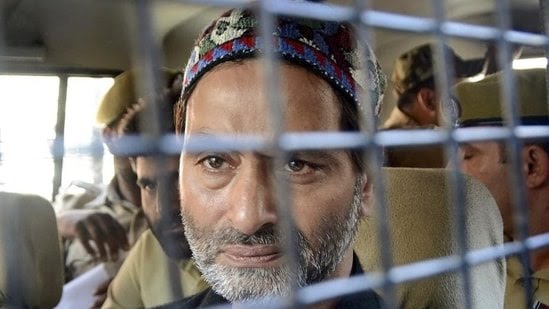Yasin Malik is a Kashmiri separatist leader and chairman of the Jammu Kashmir Liberation Front (JKLF). He was at the forefront of militancy in Kashmir until he renounced violence in 1994 and said he would pursue peaceful means for an early settlement of the Kashmiri issue. However, he was arrested in 2019 after a 2017-terror funding case was slapped against him by the National Investigating Agency(NIA).
According to Malik, at a young age, he saw violence on the streets of Kashmir unleashed by the security forces. A tiff between the army and taxi drivers, he says, was the turning point in his life, making him a rebel. He started a revolutionary front called Tala Party, disrupting political gatherings and sports events. Eventually, it led to his arrest when he protested Maqbool Bhat’s execution — The founder of the militant group, National Liberation Front (NLF).
In 1986, after his release, Yasin Malik became the general secretary of the Islamic Students League (ISL). During the 1987 legislative assembly elections, ISL campaigned for the Muslim United Front (MUF). Malik personally campaigned for Mohammad Yusuf Khan (popularly called Syed Salahudin), who later became a member and leader of the terrorist organization Hizbul Mujahideen. Later, both Yusuf Shah and Yasin Malik were arrested.
The MUF claimed that the 1987 election was rigged to favor the National Conference – Indian National Congress alliance. Incidentally, after the elections, the insurgency in Kashmir grew further. Pakistan was able to take advantage of the disgruntle among those who lost.
Released from the prison, Yasin Malik crossed the borders and took training in terror camps operating in the Pakistan-occupied Kashmir. In 1989, he got back to Kashmir to become a core member of the Jammu and Kashmir Front (JKLF), vouching he would work for the independence of Kashmir.
With weapons and training received from across the border, Yasin Malik, Hamid Sheikh, Ashfaq Wani, and Javed Ahmad Mir returned to the valley and waged guerrilla warfare with the Indian armed forces. However, by 1992 majority of the JKLF militants were either captured or killed by the security forces. Yasmin Malik was arrested again.
In May 1994, after Yasmin Malik was set free, he said he would abandon violence and adopt the Gandhian way of struggle. Pakistan is believed to have stopped its funding to JKLF after knowing that the front was seeking independence from both India and Pakistan. Also, Malik’s non-violent struggle wasn’t acceptable to JKLF leaders in Pakistan-occupied-Kashmir. By 1995, he was expelled from the post of JKLF President by its founding chairman Amanullah Khan.
Yasmin Malik was once again arrested in 1999 and 2002 under Public Safety Act (PSA) and the Prevention of Terrorism Act. Imprisoned and released after a year, Malik ran parleys with Pakistani leadership. Also, with the Indian Prime Minister and some world leaders on Kashmir. He campaigned across Kashmiri towns and villages, instigating Anti-India sentiment.
In 2013, Yasin Malik kindled a tumultuous controversy by sharing the stage with Lakshar-e-Taiba chief Hafiz Muhammad Saeed in a protest event in Islamabad. Later in the same year, he claimed that he was ousted from a hotel with his family for his separatist ideology.
Presently, Yasin Malik is under trial for the attack on 40 Indian Air Force personnel in Rawalpora (Srinagar) in January 1990. He is also facing trial in the Rubaiyya Sayeed kidnapping case, which resulted in the exchange of five militants.
Malik has been found complicit in the 2017 terror funding case. The NIA court has established with evidence that he was receiving funds from Pakistan to organize large-scale violent protests and arson in the Kashmir valley by colluding with Lakshar-e-Taiba. Though he pled guilty to the charges, Yasin Malik chose to represent himself in the NIA court. On the 19th of May 2022, the court convicted him for conspiring and waging war against the state. He has been given a life term — for offenses under section 121 (waging war against the government of India) of IPC and section 17 (raising funds for the terrorist act) of the UAPA.
Image Source: PTI
Reference: Wikipedia

